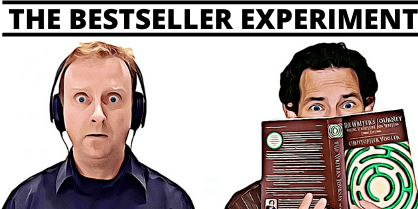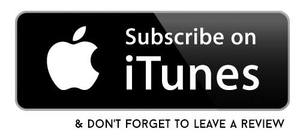EP36: For Love Or Money | Susan Kaye Quinn
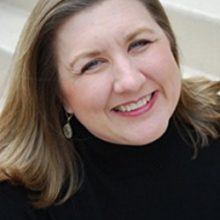
PODCAST
In this episode you will discover…
- Why you should be clear what your goals are
- Why you should formulate a five year plan to achieve those goals
- How you can make your advertising budget a revenue generator and not a cost
- And the importance of newsletters such as Bookbub
Thanks for listening and joining us. Have some feedback you’d like to share? Leave a note in the comment section below.
SPREAD THE LOVE
If you enjoyed this episode, please share it using the social media buttons you see at the bottom of the post.
SUBSCRIBE, RATE & REVIEW ON ITUNES
Please do subscribe on iTunes and leave an honest review for The Bestseller Experiment Podcast on iTunes. Ratings and reviews are extremely helpful and greatly appreciated! They do matter in the rankings of the show, and we read each and every one of them. Don’t forget, when subscribing to the show on iTunes you will get automatic updates.
If you have any questions, you can contact us here.
Episode Highlights:
- Bestseller Experiment: Facebook | Twitter (@bestsellerxp) | Instagram | Pinterest
- Scrivener – Software for Writing
- Susan Kaye Quinn: Website | Twitter | Facebook | Facebook Group| Pinterest
- Co-Hosts:
Links featured in today’s show:
- Bestseller Experiment’s Vault of Gold. Sign up to get your free Writer’s ebook
- Question Mark: Have a question you want answered on the show? Click here.
EPISODE TRANSCRIPT (HIGHLIGHTS)
Susan Kaye Quinn is not only a genuine rocket scientist, but she’s also a bestselling indie author who runs the incredible For Love Or Money Facebook group, an incredible resource for any indie author and a safe place to ask all those questions you might otherwise be too scared to ask. We covered so much when talking to her, that we had to split the interview into two parts. Here’s part one:
How did you get started writing?
I was an engineer, did a lot of research for NASA, got my PhD, I was a really serious nerd. I really loved that work, I had a really great time with it, and then I had my kids and it was really hard to do both at the same time, especially as I had three of them. I ended up staying home for a while, I really needed to get back, and I always thought I would go back to engineering, and I was casting about for ‘What’s phase two going to look like…?’ I’d always loved reading, of course, and I always loved writing, but I had never self-identified as a writer. I sat down to write and literally the next day it was like I was hooked on heroin, and I was just fabulously enamoured immediately and wrote like a demon for months and months and months. I thought I had better make a career out of this because I clearly can’t stop. It just grew from there.
I’m very lucky that I came in as a new writer right when the revolution was happening.
I didn’t self-publish my first book. I went through a small press, and had the classic horrible experience, and it was not at all what I expected, and it was right when the wave of indie publishing in late 2011 started to crest, and there was a whole group of us who got off the treadmill of traditional publishing and went into indie and took the leap. It’s really interesting now to look back. Some of us left, some of us still on top, and it’s a really interesting dynamic and really fascinating to watch unfold. The people who had the hardest time with the transition were the people who had been doing it a long time, and I didn’t have that baggage. I was coming into fresh anyway, and I did the calculus and thought I could make it work. I lucked into doing everything right, then figured it out later: oh, I did exactly what I needed to do, just without realising it. I got a little more methodical about it as time went on.
The indie community is so sharing, caring and supportive, and I love that. It feeds my artist’s soul, so much.
And I’m also this twenty-first century open source person that I buy into that philosophy. I mates really well and I’m having a great time with it. The hardest thing for me is I have too many things I want to do, and bouncing time is the key to everything.
You had a bad experience with a small press, so would you advise all authors to self-publish?
Absolutely. I don’t recommend small presses to anyone. It’s not just based on my own personal experience. I know a lot of writers and I draw on their experience. I know New York Times bestsellers, people who have sold for five years and never broken even, I have several friends who are still with the small press that I started out with, and others that are with all different types of publishers. My observation is that most small presses cannot do for you anything like what you can do for yourself, and at the same time they are hobbled by all the disadvantages that the New York publishers have, with none of the advantages. It’s the worst of all possible combinations. That’s why I pretty definitively say don’t do that.
If you’re self-publishing you control price, you control cover, you control content.
You don’t have an editor telling you to put more sex in, or less sex, or a dog that speaks German. You don’t have to have that. I was told what brand of automobile I had to have my characters drive. You have all the control.
For a lot of people that’s dangerous, because they’re nervous that they will fail and the failure will be them, and they’re right.
There’s a risk that you take. At the same time you’re in control, and if you’re the kind of person who has the right mindset where there are no failures, there are only learning experiences, then indie is for you. With New York publishing, you don’t have any of that. You don’t control the cover, you don’t control the marketing. You could try to market, but they will hobble you with price and distribution. Just having your blurb be something that sells the book – you don’t have control over that. It’s really tough. They hobble you in a lot of ways, because they think they know, and they want you to just step aside and let them take the reins. If you’re lucky and your book happens to hit the market you will have some success there, and if you do then New York publishing can actually do some things for you. They can get you into bookstores. If they buy into your success, they can build on that.
They are really good at making stars shine brighter. They’re not going to make you a star to begin with.
You are going to make you a star and if you are star material — you have a book that could zoom — you’re just as likely to do better with self-publishing, and then go traditional and have them help you shine brighter. For almost everyone I recommend self-publishing, and there are only a very few exceptions to that.
It’s not as if you don’t need to take it (a traditional publishing deal) as you don’t want to take it. It will limit you and it will make you a lot less money. The other part that they offer is glory. That is the coin of the realm for traditional publishing. If you want that glory, and that is all that it will do for, if you have no other reason, if you don’t want to make a living at it, you don’t want to have a huge catalogue, if none of that is important to you, if the only thing that’s important to you is that one book gets sold traditionally, then go directly there. For most people that’s not what they’re about. They want to make a living at it, they want to write a bunch of books.
You get very spoiled as an indie. You get to call all the shots, you get to it exactly the way you want it, and if you’re successful you’re ‘Hey, I’m successful!’ Why wouldn’t I keep doing what I do well?
In your Boot Camp book you start off by saying ‘Have a five year plan’. How did yours work out?
I started out wanting to break even on my first book. I committed to writing a trilogy, which is what I recommend to everyone to do, and I was just going to see if I could break even, hopefully, in the first six months. It was a year-long plan. Once you break even you’ve demonstrated you have a business. If you can cover your costs you’ve got a minimally viable business. And now how do you grow that to make whatever level of income you need for whatever your needs are? Some people don’t need to make money. Some people are retired, they’ve got a pension, they’re writing for fun. If it made latte money they’re fine with that. Some people desperately need something to pay for the mortgage, and they really need the cash.
If you can demonstrate that you can create a product that will sell and cover its own costs within a reasonable amount of time then this is a viable business for you.
Then, if you have the right mindset, you can grow it to become something that will be what you want it to be. I hit that two months out of the gate. Which surprised me! My next goal was to replace that engineering salary, because that was supposed to pay for kids’ college education, I had three of them and they were smart. I thought if I can hit that in five years, that’s when my youngest is going to be in school, and I really need to have a job at that point. I hit that in the first year. I’ve pretty much maintained that or more ever since. That was before I started doing my pen name, which is a whole other story. I’ve hit the goals, but you need to have actionable things that you can do to reach that goal. You can do the actions and maybe you’ll hit the goal and maybe you won’t, and you can course-correct along the way. That’s what it is with book publishing; you can set whatever goals you want, they’re the lighthouse that you’re looking towards, but you can’t look at the lighthouse all the time.
You’ve got to pay attention to the waves and you’ve got to swim so you don’t drown, that is what every day in indie publishing is like… not drowning! Now that I think about it, that’s a terrible analogy, but accurate!
What other goals do you see indie authors trying to achieve?
A lot of it is what money means. Money is so valued by our society, and we forget that it translates into a thing. Maybe it’s freedom to write whatever you want? Or whatever you want with your time? For me, funding my kids going to college is starting to happen — my first one is going this Fall —which is freaking me out, and it’s very important to me that all of my kids had the ability to go to whatever college they wanted no matter how expensive it was. It’s a very personal goal to me, that happens to come with a price tag. A lot of people have that, but they don’t always put it that way in their mind.
I always say find what your mountain is. Don’t climb a mountain that, when you get to the top, it’s not what you actually wanted.
You sold that million books, but what does that actually mean to you? Who cares? It’s cool and really fun to brag about, but when you’re home at night with your husband on the couch… what does that actually mean to you? Because that’s where the satisfaction comes. I know way too many authors where I’ve seen them go through the cycle again and again where they get popular, they sell a bunch of books, and then they’re like… where’s the meaning? What am I actually doing with my life here? I’m spending all my time selling books, or writing books, and I don’t have time to play with my kids.
You want to make sure you can picture the perfect life that you would like to have and work towards that. What I want next is much more lifestyle focused. I want to do fun things before I die! That determines how much I can write and how much I can publish.
Your Facebook Group is called For Love Or Money, and you have to answer a question when you join… Tell us about the kinds of answers you’ve had.
It’s a thing Facebook enacted where you can actually ask people to answer a question, and so I asked them what’s one of your goals in publishing, and I get everything from ‘I want to get an agent,’ — and I’m like, ‘Not the right group… y’all can come in, but you’re not gonna find an agent here.’
Just today I approved a couple. One was talking about fear. She says she’s written a book, and she’s written all her life, and I’ve finally finished a novel, but I am so afraid, I’m locked up. It’s like a confessional, this little box. Everybody has some element of that, and if you don’t it’s because you’re not reaching hard enough into things that are uncomfortable for you, which you need to do as a writer and as a businessperson.
You need to takes risks with your craft, and with your business in order to be successful. Everyone has to wrestle that fear bear and get a hold of how to manage that in order to move on. It’s fun to read those every day and get a pulse of what people are thinking.
Have you got a sense of how many books you need to sell to meet an average income?
It’s highly variable. The way I would approach it would be, just assume you can get on average two bucks a book, now tell me how much money you need to make. Because everyone has something different. I know people who are in North Dakota who can get by on so little money, they live very frugally, which is brilliant. You’re an author; you don’t have to be anywhere. So why not be where it’s cheap to live? Figure out what it is you need, and if you don’t really know, just look at whatever the average income is in your area. That’s a benchmark, if nothing else, and when I say I make a living, people ask what that means… Average income in my state, I make more than that. That’s my benchmark to give people an idea. But if it’s forty thousand dollars a year, which is the average income for the US, which isn’t really a lot of money, that’s roughly twenty-thousand books, which sounds like a lot of books, and it is a lot of books… if you only have one.
The key is to have more than one book. The people who want to earn a living out of the gate with one book are not being realistic.
That could happen, it has happened, I’ve seen it happen, I’ve seen people hit New York Times bestseller lists with their first book… that’s not going to happen to you. That’s one person, and I know five thousand authors. You need to break even with your first book in six months and go, ‘Yeah, I’m doing good,’ and build from there. It’s the people who have the outsized and unrealistic expectations that I see go into a dark depression for about six to nine months, come back about a year after that, because they’ve just walked away completely, and they’re like, ‘Okay, I’m finally ready to try again.’ Because it’s devastating. And I get a lot of try-againers coming to the group, and they private message me, ‘Sure, I’ve been despondent and here’s my whole sad story!’
And I’m, like, breathe, we’re going to help you here and we’re going to get you back on track, and here’s how we’re going to do it. I can’t do that for everyone, because I only have so many hours and I have to write my own books. I do it every once in a while and it’s very gratifying to be able to help people get re-launched again.
You’ve not had great experiences with Facebook ads. Can you talk about that?
Every piece of advice that I give in the books, in the group, everything has to be caveated, ‘This is aimed at the average writer.’ This is what will work for the average writer. If it doesn’t work for pretty much every body, I’m not going to recommend it, and if you go and survey how many people who have run Facebook ads and how many people who have been successful in running Facebook ads, especially the people who have been successful to the level that Mark Dawson has, then the numbers are vanishingly small.
The normal world looks at advertising being a cost, not a revenue generator, but ultimately in the greater scheme you want it to be a revenue generator.
I back way off on the Facebook ads, because they’re a very expensive form of advertising, and they’re very hard to do well, and I don’t even do them very well. I don’t use them personally that much. I do on occasion and under certain circumstances, but it’s not my style to invest a ton of money in that kind of advertising. Same with Amazon Marketing Services ads, same with Bookbub ads, I’ve tried them all, I’ve experimented with them all, because I have that engineering brain. I can’t help myself from experimenting with them. They’re all in that high-risk, high-cost category.
Lower-risk, lower-cost methods of advertising are definitely where people should start. Then they can expand to the more higher-risk things. That’s the way that I recommend.
What currently works for you?
Everybody should be doing newsletter advertising like Bookbub, Book Barbarian, there’s a whole bunch of newsletter services where they collect subscribers, and then they email them deals every day. You purchase an ad to be one of the deals offered for the day and it’s great in a number of ways. They segment out by genre, so you’re at least getting in the ballpark of your genre. Second of all, people self-select. They’re only going to click on your book if they like your book and they do it in sufficient numbers that it actually generates some good ‘also-boughts’ on Amazon, it gives you the right kind of readers, it gives you new readers.
They’re not the readers who are already in your eco-system, these are new fish coming into your pond, and that’s what you need a constant inflow of.
My pen name, who writes romance, she buys all the ads she can every month. She has a lot of books and a lot of sales and she buys as much as she can, because every month that she does that she magnifies her money. I can’t pin the return on investment down to each individual ad anymore, because it’s not really the right approach. I have a budget for advertising, when I spend my budget my income goes up. When I don’t spend my advertising budget, my income goes down. And there are months where I don’t spend my budget because I’m too busy writing books. This is part of why I have an assistant now, to help me manage all of that and keep it on the rails. I recommend starting there, and if you go to the group, we have a list of the good ads that you can buy like that. And if you’re unsure for your genre what’s the best place, you can post in the group and people will answer it.
They’re fantastic that way, it’s a very interactive group. People are always on there answering questions, it’s wonderful.
Are newsletters like Bookbub getting more difficult to get into?
Bookbub is the gold standard. They have millions of subscribers. They’re huge. Everybody blanches at the cost, because it’s hundred of dollars to buy an ad with them, but I have never — okay, I won’t say never — very rarely does Bookbub not pay itself back in twenty-four hours. They price it that way. They are statistic monsters. They have all the data, they know exactly what you’re book is going to make. They don’t choose you unless you’re going to pay back, and they calculate the rates right at that line. Take a Bookbub ad any time you can. They’re currently biased against anyone in Kindle Unlimited — so, if you’re in KU, it’s not you, it’s them. All the other ads come and go, they grow and decay, and they’ll raise their prices and sometimes they’ll overshoot. Everything’s dynamic, everything’s changing. I’ve seen ads that worked great six months ago, and not work any more — for me — but they might work for somebody else because they’ll be fresh in the pond.
You just have to keep experimenting. Constantly. All the time. Forever. Pretty much. If you don’t like that, this might not be the gig for you.
Go for the dependable job with the regular paycheque, and that’s totally fine. That’s not being a failure as a writer, that’s just saying ‘That business over there is nuts, I am not doing that, my life is so much better when I can just have my normal job and write my stories at the weekend and have my thousand fans or whatever…’ That’s the mountain.
Know which mountain you want to climb. And you may not know until you try and climb the other one.
There’s one thing that I love about the group, and it’s a baseline, and it’s that we respect everybody. If you’re a writer, published, unpublished, bestseller, no-seller, part-time, full-time it doesn’t matter. If you are on that journey, you are part of our tribe. And we are going to respect whether you do it one hundred percent for love, or if you’re out there chasing the money, because you need the money, whatever your reasons, we’ll hundred percent support that too. That’s my rule. If you’re going to come to the group, you’ve got to be on board with that.
Is your pen name, your anonymous other self, like a control group in an experiment?
That’s a fantastic way of thinking of it, but no, she’s more like a petri dish. She incubates all these weird things, ‘Ooh, let’s try that with Pen Name, because there are no consequences.’ If it works, then we port it over to SKQ. I just recently started going the other way, too, where SKQ is currently experimenting with going wide after having been in Kindle Unlimited for a long time, and I’m taking the results from that and applying it back to Pen Name. It really does cross-pollinate a lot, and it gives me a lot of perspective writing in two totally different genres, because the rules are very different in many ways, about how you sell books, and what is required to sell books. It’s a huge education.
We’ve got five months to go, what advice would you give us?
I would think about your first year, I would think way beyond that first book, because you’re not launching a book, you’re launching a career… hopefully. Figure out your mountain: what are you in this for? I get the sense that you’re very engaged in the community, you like talking to people because you’re doing a podcast, you enjoy doing things that are more than just writing the book. You want to preserve that as you go beyond… or not. Think about that. Think about what if the thing’s a success; are you doing a trilogy? Which is what I recommend, so you can capture some immediate momentum. There’s a lot of people who come out of the gate and have great success and then they’re like… Where’s book two? And there’s no book two, and there’s no book two for another year, and you lose a lot in that time.
Do what’s right for your career and your audience will understand.
Figure out what that arc looks like. In a success scenario and in a not-so-success scenario, where you don’t hit your benchmarks and things fizzle and you’ve got to re-tool. You’ve got a range of possible outcomes and then you’ve quantified it, and then you can go in full-steam.
I am constantly helping people launch and re-launch, and one reason I do that is to constantly have a finger on the pulse of what actually works for new people. So, I can have some confidence that the advice I’m giving out to people is not totally sending them down the garden path.
Whenever you start a new series you are basically starting over. People want to think that it will just be a monotonically increasing success ladder that they’re climbing and it is so not like that. You’ll do that for your first series. It really is very cyclical, and whenever you’re starting with a new series you’re starting over with a fresh chance, but you’re also having to start over from scratch. Porting fans from one series to another is not easy, unless you’re writing exactly in the same genre, with exactly the same kind of stories — which my Pen Name does and she still has a hard time.
Readers are very fussy, sometimes you hook them and sometimes you don’t, but the one thing to think about is some kind of teaser piece that you can write.
Some kind of compelling backstory for your main character that is some trauma in his past that now informs the midpoint of the first book, and it intrigues people with a secret that everyone will like to know like crazy, and you’re so not telling them! And it’s not vital to the story. Now you have a hook. When you write that story, it needs to be a complete story unto itself; it has a beginning, a middle and an end. Because what you’re doing is you’re using it as your showpiece. It’s you showing your chops. Can I write you a story that you’re just going to dig, and it’s going to finish well, and it’s going to give that ‘Hmm, yes!’ feeling, and at the same time I’m totally intrigued by this whole world that you’ve created, or these characters that you’ve created are so fascinating, witty and fun, I’ve got to go and read that novel. You’ve got to go in both directions; you’ve got this piece that you’re going to send out on Instafreebie, you’re going to give it away free, you’re going to use it anywhere and everywhere, and you’re going to use it for your newsletter sign-up, so people who read your first novel when it comes out are going to subscribe to get that baby, and they’ll be there when your second book launches, because they’ll be on your subscriber list. That’s the key that I see as being really helpful.
And you can do that now. You can start today. Write that story, get it our there, have it be building a list for you before you ever launch your first book.
SHARE THE MEMES…
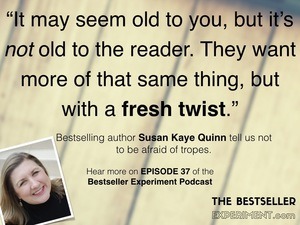
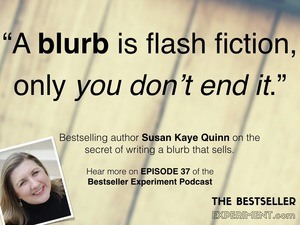
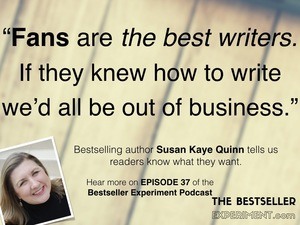
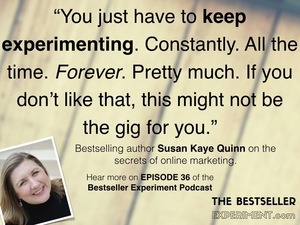
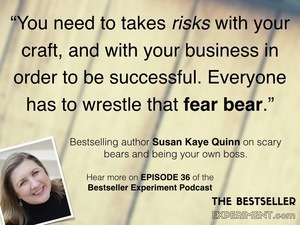
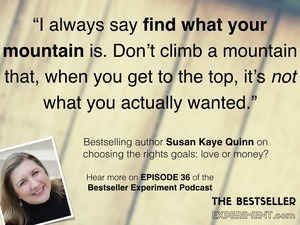
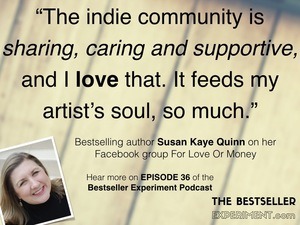
VIDEO TRAILER
SHARE THE PODCAST WITH A FRIEND
SUBSCRIBE TO THE BESTSELLER EXPERIMENT PODCAST!
